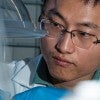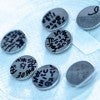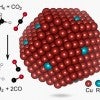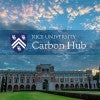
Literal rise of the internet enables new climate science
Collaborative National Science Foundation grants will use data from internet balloons to study atmospheric gravity waves and their influence on the weather and climate.

Literal rise of the internet enables new climate science
Collaborative National Science Foundation grants will use data from internet balloons to study atmospheric gravity waves and their influence on the weather and climate.

Ocean water could melt precarious Antarctic glacier
Rice University researchers, alumni and staff are part of an international effort that has discovered a pathway for warm ocean water to melt the underside of Thwaites Glacier, a precarious body of west Antarctic ice that could add as much as 25 inches to global sea level if it were to suffer a runaway collapse.

Fast calculation dials in better batteries
A simpler and more efficient way to predict performance will lead to better batteries, according to Rice University engineers.

Funding flows into liquid fuel strategy
The National Science Foundation awards a $2 million collaborative grant for the development of methods to convert carbon dioxide into liquid fuels.

People, papers and presentations July 27, 2020
Haotian Wang, the William Marsh Rice Trustee Assistant Professor of Chemical and Biomolecular Engineering, is among 59 early-career scientists selected to take up the challenge of greenhouse gas accumulation in Earth's atmosphere and oceans in Scialog: Negative Emissions Science

Future Texas hurricanes: Fast like Ike or slow like Harvey?
Climate change will make fast-moving storms more likely in late 21st-century Texas.

Rice scientist goes deep to improve environmental tracers
Rice Earth scientist Laurence Yeung earns a prestigious National Science Foundation CAREER Award to improve our understanding of the biosphere’s productivity.

Rice University's Carbon Hub kicks off Feb. 13
HOUSTON -- (Feb. 6, 2020) -- Experts from industry, academia and government will gather at Rice University's Carbon Hub Kickoff Meeting Feb. 13 to discuss the challenges and opportunities of transitioning to a zero-emissions future where hydrocarbons provide both clean hydrogen energy and advanced carbon materials that help house, move and feed people.

Algae team rosters could help ID 'super corals'
U.S. and Australian researchers have found a potential tool for identifying stress-tolerant "super corals." In experiments that simulated climate change stress, researchers found corals that best survived had symbiotic algae communities with similar features.

Climate change 'a strategic dilemma' for Persian Gulf, Baker Institute expert says
Climate change poses a strategic dilemma for oil-exporting states of the Persian Gulf, according to a new paper by an expert in the Center for Energy Studies at Rice’s Baker Institute for Public Policy.

Less may be more in next-gen batteries
Rice University engineers build full lithium-ion batteries with silicon anodes and an alumina layer to protect cathodes from degrading. By limiting their energy density, the batteries promise excellent stability for transportation and grid storage use.

Rice University engineers have created a light-powered nanoparticle that could shrink the carbon footprint of syngas producers.

Rice University launches bold climate change initiative with Shell
With initial support from Shell, Rice University has launched Carbon Hub, a climate change research initiative to fundamentally change how the world uses hydrocarbons. Carbon Hub's goal is a zero-emissions future in which hydrocarbons are not burned. Instead, they are split to make clean hydrogen energy and valuable carbon materials.